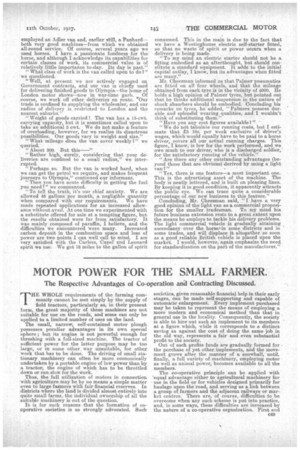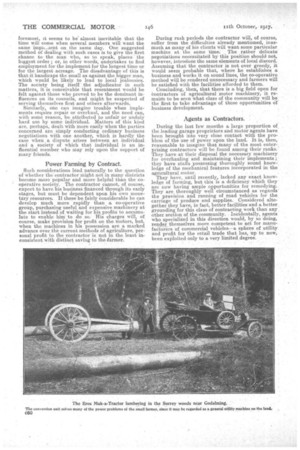MOTOR POWER FOR THE SMALL FARMER.
Page 13

Page 14

If you've noticed an error in this article please click here to report it so we can fix it.
The Respective Advantages of Co-operation and Contracting Discussed.
THE WHOLE requirements of the farming community cannot be met simply by the supply of field tractors, particularly as, in their present form, the great majority of these machines are not suitable for use on the roads, and some can only be applied to a, limited number of uses on the land.
The small, narrow, self-contained motor plough possesses peculiar advantages in its own special sphere ; but its engine is not powerful enough for threshing with a full-sized machine. The tractor of sufficient power for the latter purpose may be too large, or in some other way unsuitable, for other work that has to be done. The driving of small stationary machinery can often be more economically undertaken by a portable engine of low power than by a tractor, the engine of which has to be throttled down or run slow for the work.
Thus, the full utilization of motors in connection with agriculture may be by no means a simple matter even to large faatners with fair financial reserves. In districts where the land is divided almost entirely into quite small farms, the individual ownership of all the suitable machinery is out of the question.
It is for such reasons that the formation of cooperative societies is so strongly advocated. Such
societies, given reasonable financial help in their early stages, can be made self-supporting and capable of automatic enlargement. Every implement purchased may be taken to represent the means of employing a more modern and economical method than that in general use in the locality. Consequently, the society is able to hire' out such an implement to its members at a figure which, while it corresponds to a distinct saving as against the cost of doing the same job in the old way, represents a fair and even substantial profit to the society.
Out of such profits funds are gradually formed for the purchase of yet other.irnplements, and the movement grows after the manner of a snowball, until, finally, a full variety of machinery, employing motor as well as animal power, becomes available to all the members.
The co-operative principle can be applied with equal advantage either to agricultural machinery for use in the field or for vehicles designed primarily for haulage upon the road, and serving as a link between a group of farmers and the adjacent railways or market centres. There are, of course, difficulties to be overcome when any such scheme is put into practice, and, in some ways, these difficulties are increased by the nature of a co-operative organization. First and foremost, it seems to be almost inevitable that the time will come when several members will want the same impi,aent on the same day. One suggested method of dealing with such cases is to give the first chance to the man who, so to speak, places the biggest order ; or, in other words; undertakes to find employment for the implement for the longest time or for the largest. acreage. The disadvantage of this is that it handicaps the small as against the bigger man, which would be likely to lead to local jealousies. The society being itself the adjudicator in such matters, it is conceivable that resentment would be felt against those who proved to be the dominant influences on its councils, and might be suspected of serving themselves first and others afterwards.
Similarly, one can imagine trouble when implements require repair or overhaul, and the need can, with some reason, be attributed to unfair or unduly hard use by some individual. Matters of this kind are, perhaps, dealt with more easily when the parties concerned are simply conducting ordinary business negotiations with one another, which is hardly the case when a dispute arises between an individual and a society of which that individual is an influential member who may rely upon the support of many friends.
Power Farming by Contract.
Such considerations lead naturally to the question of whether the cont i ractor Might not n many districts become more popular and more helpful than the cooperative society. The contractor cannot, of course, expect to have his business financed through its early stages, but must be dependent upon his own monetary resources. If these be fairly considerable he can develop much more rapidly than a co-operative group, purchasing useful and expensive machinery at the start instead of waiting for his profits to accumulate to enable him to do so. His charges will, of course, make provision for profit on the motors, but, when the machines in his possession are a marked advance over the current Methods of agriculture, personal profit to the contractor is not in the least inconsistent with distinct saving to the ,farmer.
During rush periods the contractor will, of course, suffer from the difficulties already mentioned, inasmuch as many of his clients will want some particular• machine at the same. time: The rather delicate negotiations necessitated by this position should' not, however, introduce the same elements of local discoid. Assuming that the contractor is not over greedy, it would seem probable that, where he establishes a business and works it on sound lines, the co-operative method will be rendered unnecessary and farmers will be satisfied with the facilities afforded to them.
Concluding, then, that there is a big field open for Contractors of agricultural motor machinery, it remains to be. seen what class of the community will be the first to take advantage of these opportunities OF ,business development.
Agents as Contractors.
During the last few months a large proportion of the leading garage proprietors and motor agents have been brought into very close contact with the problem of the use of power upon the land. It is, then, reasonable to imagine that many of the most enterprising contractors will-be found among their ranks.' They have .at: their disposal the necessary machinery for overhauling and maintaining their implements ; they have staffs possessing thoroughly sound knowledge of the mechanical features incorporated in theaigricultural motor.
They have, until recently, lacked any exact know ledge of farming, but this is a deficiency which they are now having ample .opportunities for remedying..
They are thoroughly well circumstanced as regards' the provision and running of road vehicles for the. carriage of produce and supplies. Considered altogether they have, in fact, better facilities and a better grounding for this class of contracting work than any, other, section. of the community. Incidentally, agents who specialized in this direction would, by so doing, render themselves . more competent to act for manufacturers of commercial vehicles—a sphere of utility and profit for the retail trade that has, up to now, been exploited only to a very limited degree.






















